Ramat HaSharon
Ramat HaSharon (Hebrew: רָמַת הַשָּׁרוֹן, lit. Sharon Heights, Arabic: رمات هشارون)[2][3][4] is a city located on Israel's central coastal strip in the south of the Sharon region, bordering Tel Aviv to the south, Hod HaSharon to the east, and Herzliya and Kibbutz Glil Yam to the north. It is part of the Tel Aviv District, within the Gush Dan metropolitan area. In 2021 it had a population of 47,970.[1]
Ramat HaSharon
רמת השרון رمات هشارون | |
|---|---|
| Hebrew transcription(s) | |
| • ISO 259 | Ramat ha Šaron |
 Central City of Ramat HaSharon | |
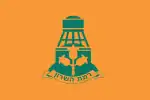 Flag  Coat of Arms | |
 Ramat HaSharon  Ramat HaSharon | |
| Coordinates: 32°09′N 34°50′E | |
| Country | |
| District | |
| Founded | 1923 |
| Government | |
| • Mayor | Avi Gruber |
| Area | |
| • Total | 16,792 dunams (16.792 km2 or 6.483 sq mi) |
| Population (2021)[1] | |
| • Total | 47,970 |
| • Density | 2,900/km2 (7,400/sq mi) |
| Name meaning | Sharon Heights |
| Website | ramat-hasharon.muni.il |
History
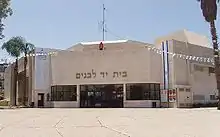
Ramat HaSharon, originally Ir Shalom (Hebrew: עִיר שָׁלוֹם, lit. City of Peace), was a moshava established in 1923 by olim from Poland.[5] It was built on 2,000 dunams (2 square kilometres (0.77 sq mi)) of land purchased for 5 Egyptian pounds per dunam. In the 1931 census, the village had a population of 312.[6]
In 1932, the community was renamed Kfar Ramat HaSharon (Heights of Sharon Village).[7] By 1950, the population was up to 900. Rapid population growth in the 1960s and 70s led to construction of many new roadways, schools and parks. Several distinct neighborhood evolved in the 1970s, including Morasha on the southern edge, one with many military and air force personnel in the eastern edge, and many successful professionals moved into the developing city. Ramat HaSharon became a highly desirable place to live in the 1980s as a very safe place, containing many gardens and wide boulevards, and attracting many upper middle class suburban families.
While qualifying for city status by number of residents (with more than 30 thousand residents) from the 1980s, Ramat HaSharon's mayors preferred to maintain the local council designation and acted to maintain the character of the settlement by limiting development. In 2002, Ramat HaSharon was granted city status.
In August 2021, Israeli archaeologists led by Yoav Arbel announced the discovery of Byzantine-era wine press paved with a mosaic along with a coin minted by Emperor Heraclius. According to coin expert Robert Kool, one side of the gold depicted the emperor and his two sons, while the other side depicted the hill of Golgotha in Jerusalem. A Greek or Arabic inscription was engraved on the surface of the coins, probably with the name of the coin owner. According to Yoel Arbel, stone mortars and millstones were used to grind barley and wheat and very likely also to crush herbs and healing plants.[8][9][10]
 Ramat HaSharon 1942 1:20,000
Ramat HaSharon 1942 1:20,000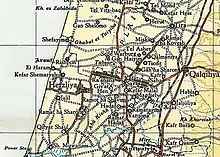 Ramat HaSharon 1945 1:250,000
Ramat HaSharon 1945 1:250,000
Geography
The main portion of the city is located north of Highway 5, east of Highway 20 and Glil Yam, to the west of the Israel Military Industries factory and Highway 4, and to the south of Herzliya. The city's administrative boundaries extend in a L shaped fashion to the south of highway 5 and bordering with Tel Aviv reaching until Highway 2 in the west.
The Neve-Gan neighborhood is disconnected from the rest of the city and is located to the south of the main city, and is adjacent to Kiryat Shaul Cemetery Tel Aviv's Tel Baruch. The Israel Tennis Centers is also south of route 5. The Cinema City commercial complex is similarly disconnected from the city and is located on the intersection of highway 5 and 2.
Economy
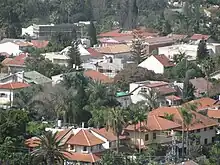
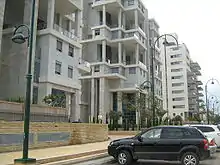

Until the 1960s, it was primarily a farming community, known for its strawberry fields and citrus groves. Ramat HaSharon is also home to Israel Military Industries, the manufacturer of weapons and small arms for the Israel Defense Forces and the world market.
Education
Ramat Hasharon has seven elementary schools,[11] two middle schools (Alumim, and Kelman), and two high schools (Rothberg, and Alon). Midrasha LoOmanut, an art teachers training college, and Rimon School of Jazz and Contemporary Music are located in the city.[12] The Geology Museum is located in a Bauhaus style building built in 1945.
Sports
Ramat HaSharon is home to the Israel Tennis Center, founded in 1975, which hosts and organizes international, national and regional tennis tournaments. The courts are also widely used during the Maccabiah Games.[13] The ATP World Tour, which had been in Israel from 1987 to 1996,[14] was scheduled to return to the Israel Tennis Center in September 2014 with the Negev Israel Open,[15] but the event was cancelled because of the military conflict in the region.[16] Along with tennis facilities, which include 24 illuminated courts, and stands which seat up to 4,500 spectators, the central management of the organization, which manages 13 other tennis centers around the country, is located in the town. It also is home to Canada Stadium, where most Davis Cup and other significant Israeli matches have been played since the mid-1970s.
Herbalife Ramat HaSharon is the city's women basketball team, one of the leading teams in the Israeli league and a former European champion. The city's football team, Hapoel Ramat HaSharon, plays in Ligat Ha'al, the premiere league of Israeli football. Alumim, one of the city's junior high schools, has won many trophies in sports, especially for achievements in track and field.
Notable people
- Chava Alberstein, singer, lyricist, composer, and musical arranger[17]
- Mark Azbel, physicist and human rights defender[18]
- Haim Bar-Lev, Israel Defense Forces Chief of Staff and government minister[19]
- Niv Berkowitz (born 1986), basketball player
- Gilad Bloom (born 1967), tennis player
- Mike Burstyn, American actor
- Amnon Dankner (1946–2013), newspaper editor and author
- Shay Doron (born 1985), WNBA basketball guard (New York Liberty)[20]
- Amit Farkash (born 1989), Canadian-born Israeli actress and singer
- Yehoram Gaon, singer, actor, director, producer, and TV and radio host[21]
- Julia Glushko (born 1990), tennis player
- Gidi Gov, singer, TV host, entertainer, and actor[22]
- Rami Kleinstein, singer and composer[23]
- Uri Levine (born 1965), entrepreneur who co-founded Waze
- Harel Levy (born 1978), tennis player and Davis Cup team captain; highest world singles ranking # 30
- Sivan Levy (born 1987), singer-songwriter, filmmaker, and actress
- Gigi Levy-Weiss, businessman
- Amos Mansdorf (born 1965), tennis player; highest world singles ranking # 18
- Doron Medalie (born 1977), songwriter, composer and artistic director
- Gal Mekel (born 1988), played for the Dallas Mavericks of the NBA, former NCAA basketball player at Wichita State, 2-time (2011, 2013) Israeli Basketball Super League MVP
- Haim Moshe, singer[24]
- Yael Naim, French-born singer[25]
- Orna Ostfeld (born 1952), basketball player and coach
- Svika Pick, singer and composer
- Haim Ramon, member of the Knesset and Vice Prime Minister[26]
- Lior Raz (born 1971), actor and screenwriter[27]
- Rita, singer and actress[28]
- Anna Smashnova, tennis player
- Guy Solomon (born 1977), football goalkeeper
- Dudu Topaz, comedian, actor, author, and TV and radio host
- Ezer Weizman, commander of the Israeli Air Force, Minister of Defense, and President of Israel[29]
- Shelly Yachimovich (born 1960), politician
- Eli Yatzpan, TV host and comedian[29]
- Rehavam Zeevi, general, politician, and historian[30]
- Yuval Zellner (born 1978), politician
- Naor Zion, comedian, actor, writer and director
Twin town and sister cities
Ramat HaSharon is twinned with:
 Dunkerque, France (since 15 September 1997)[31]
Dunkerque, France (since 15 September 1997)[31] Saint-Maur-des-Fossés, France [32]
Saint-Maur-des-Fossés, France [32] Georgsmarienhütte, Germany[33]
Georgsmarienhütte, Germany[33] Tallahassee, Florida, United States[34]
Tallahassee, Florida, United States[34]
See also
References
- "Regional Statistics". Israel Central Bureau of Statistics. Retrieved 22 February 2023.
- "Ramat HaSharon | Buildings | EMPORIS". www.emporis.com. Archived from the original on 22 October 2015.
- "Sharon Definition and Meaning - Bible Dictionary". biblestudytools.com. Archived from the original on 28 October 2019. Retrieved 28 October 2019.
- "رمات هشارون مدينة سلام". Israeli Foreign Ministry Website. Archived from the original on 31 March 2022. Retrieved 30 March 2022.
- HaReuveni, Immanuel (1999). Lexicon of the Land of Israel (in Hebrew). Miskal – Yedioth Ahronoth Books and Chemed Books. ISBN 978-965-448-413-8.
- Vilnai, Ze'ev (1980). "Ramat HaSharon". Ariel Encyclopedia (in Hebrew). Vol. 7. Tel Aviv, Israel: Am Oved. p. 7582.
- "Ramat HaSharon-Timeline". Ramat HaSharon History website. Archived from the original on 29 September 2013. Retrieved 24 July 2012.(in Hebrew)
- Gershon, Livia. "Byzantine-Era Wine Press, Gold Coin Found Near Tel Aviv". Smithsonian Magazine. Archived from the original on 31 August 2021. Retrieved 31 August 2021.
- "Cookware, gold coin shed light on life in Ramat Hasharon 1500 years ago". The Jerusalem Post | JPost.com. Archived from the original on 31 August 2021. Retrieved 31 August 2021.
- Winer, Stuart. "Building project unearths ancient history in Tel Aviv suburb". www.timesofisrael.com. Archived from the original on 31 August 2021. Retrieved 31 August 2021.
- "מדור בתי ספר יסודיים | רמת השרון". Archived from the original on 2 May 2014. Retrieved 3 September 2017.
- "Rimon School of Jazz and Contemporary Music". Archived from the original on 23 October 2013.
- Kaplan, Ron (7 July 2015). The Jewish Olympics: The History of the Maccabiah Games. Skyhorse Publishing. ISBN 9781632208552. Archived from the original on 15 September 2023. Retrieved 16 December 2020 – via Google Books.
- "Tennis: Israel to host ATP Tour event at Ramat Hasharon". The Jerusalem Post - JPost.com. Archived from the original on 14 July 2014. Retrieved 8 July 2014.
- "Tournaments | ATP Tour | Tennis". Archived from the original on 26 August 2014. Retrieved 8 July 2014.
- "ATP World Tour". Archived from the original on 4 August 2014. Retrieved 4 August 2014.
- Ben-Tal, Daniel (22 February 2004). "Alberstein reaching out to US". The Jerusalem Post. Archived from the original on 20 July 2012. Retrieved 14 August 2023.
{{cite news}}: CS1 maint: unfit URL (link) - "Science and Research". landingpage.jpost.com. Archived from the original on 1 April 2020. Retrieved 19 April 2020.
- Israel. Merkaz ha-hasbarah; Israel (1990). Israel government year book. Central Office of Information, Prime Minister's Office. Archived from the original on 15 September 2023. Retrieved 29 March 2011.
- Livnat, Arie (15 March 2011). "Shay Doron, a candidate for FIBA Player of the Year, takes the accolades in stride". Haaretz. Archived from the original on 3 November 2012. Retrieved 29 March 2011.
- פרסום ראשון: 28/12/09, 21:05ירעם נתניהו, "בשבע" (28 December 2009). "קולו של אבא – יהורם גאון חוגג 70 – חינוך ותרבות – חדשות – ערוץ 7". Inn.co.il. Archived from the original on 2 May 2014. Retrieved 29 March 2011.
{{cite web}}: CS1 maint: multiple names: authors list (link) - "Gidi Gov, still groovin' at 60". TheMarker. Archived from the original on 16 July 2014. Retrieved 26 October 2011.
- "A reflection of their love". Jerusalem Post. 14 June 2007. Retrieved 29 March 2011.
- "kan-nam.co.il כאן נעים: רמת השרון". Kan-naim.co.il. Archived from the original on 2 May 2014. Retrieved 29 March 2011.
- Archived at Ghostarchive and the Wayback Machine: "YouTube – Din Din Aviv and Yael Naim – Mashmauyot". YouTube.
- Rodan, Steve (31 December 1993). "Of Two Worlds". The Jerusalem Post. Archived from the original on 22 July 2012. Retrieved 15 August 2023.
{{cite news}}: CS1 maint: unfit URL (link) - "Lior Raz Archives". Jewish Journal. 23 May 2018. Archived from the original on 25 February 2022. Retrieved 30 November 2020.
- Kupter, Ruta (12 January 2007). "Up Close and Personal". Haaretz. Archived from the original on 25 September 2015. Retrieved 29 April 2018.
- Weizman, Ezer (26 August 2008). The battle for peace. Bantam Books. ISBN 978-0-553-05002-8. Archived from the original on 15 September 2023. Retrieved 29 March 2011.
- Rice, Oren; Shalev, Oded (17 October 2001). "We Lost a Great Person, a Friend, a Commander and Warrior" (in Hebrew). Ynet. Archived from the original on 11 June 2014. Retrieved 25 July 2010.
- "Dunkirk International" (in French). Archived from the original on 9 November 2007. Retrieved 8 March 2015.
- "Jumelage Ramat Hasharon – Saint Maur des fossés". 5 August 2009. Archived from the original on 15 September 2023. Retrieved 30 August 2011.
- "Ramat HaSharon (Israel)". Georgsmarienhütte Municipality. Retrieved 17 December 2007. (in German)
- "Tallahassee ends 'sister city' relationship with Russian city". WTXL ABC 27 Tallahassee News. 3 March 2022. Archived from the original on 31 August 2023. Retrieved 31 August 2023.

